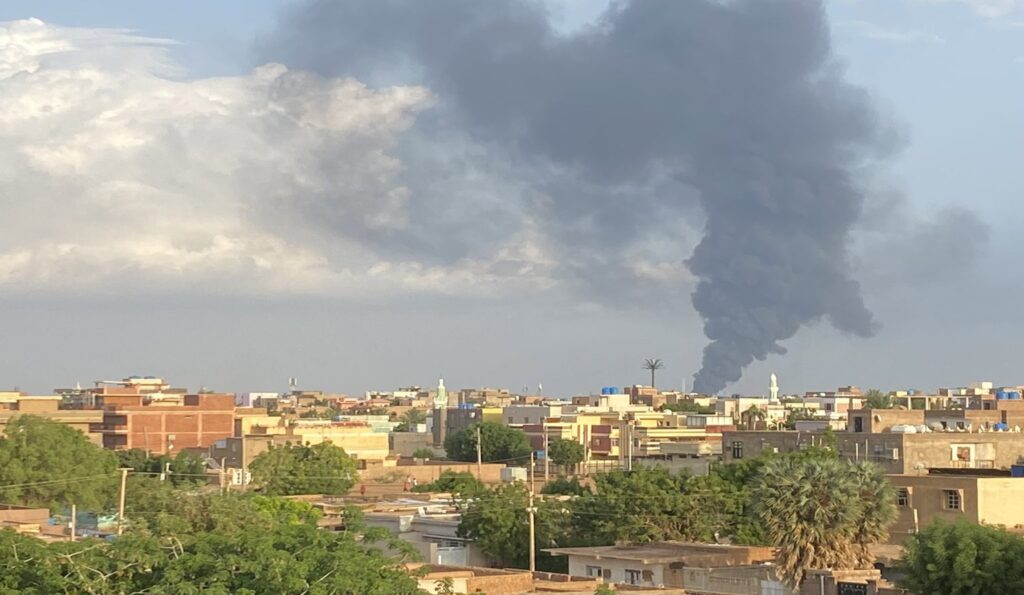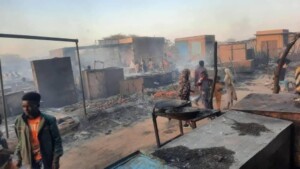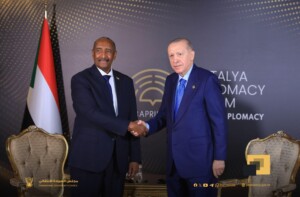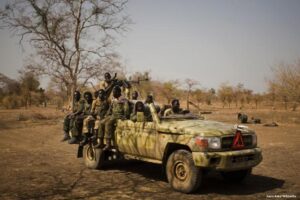Sudan war: airstrikes on Republican Palace, civil servants await salaries, fuel prices rise

Sudanese air force targets areas in Khartoum North, August 6 (Photo: social media)
Fighting between the Sudan Armed forces (SAF) and the Rapid Support Forces (RSF) intensified on Sunday, with the air force attacking the Republican Palace in central Khartoum. Six people were killed in attacks on RSF sites in Omdurman. Banks in several states have opened their doors again. The Ministry of Energy and Oil has raised the fuel prices. The Ministry of Finance is only paying salaries of civil servants in the federal government and in Khartoum.
Clashes between the SAF and the RSF on Friday led to the death of five people in old Omdurman. The house they were in, was hit by a missile launched by the RSF, the Wad Nubawi Resistance Committee reported in a statement yesterday.
The resistance committee strongly condemned the fighting in residential areas, and accused the RSF of continue their human rights violations, including expelling people from their homes and stealing their property and vehicles.
The grass roots activists called for the classification of the RSF as a “terrorist militia,” and said they categorically reject a merge of the RSF with the SAF, as was negotiated before fighting broke out on April 15, but instead led to the current prolonged war.
On Saturday, a person was killed and another wounded in heavy gunfire towards Mahdawi, near Sabrin in Omdurman.
Republican Palace
Sudanese army forces yesterday bombed and shelled the Republican Palace, which has been under control of the RSF since the war broke out in mid-April.
“This is for the first time in months that the army is targeting the Republican Palace,” sources told Radio Dabanga from the capital.
The SAF also launched intensive air strikes on Yarmouk military complex south of the El Shajara residential neighbourhood in west Khartoum, which was occupied by the RSF in early June, and on several areas of Omdurman.
On Saturday, the areas near the military complex witnessed heavy fighting between the army and the paramilitaries.
SAF spokesperson Nabil Abdallah said in a press statement that day that the army was able “to repel an RSF attack in the vicinity of the military compound and inflicted losses in lives and property”.
He denied rumours that the SAF has taken control of Africa Road (aka Airport Road) west of the airport.
The RSF said in a statement later on Sunday that the army tried to break the siege on the Yarmouk complex, but its paramilitaries, aided by enforcements sent from other areas, managed to repel the attack and inflicted losses on the army.
Prices, banks
The Ministry of Energy and Oil announced on Sunday that it has raised the prices of petrol and diesel.
The ministry said in a press statement that it was decided to increase the litre price of petrol from SDG585 to SDG630, and diesel from SDG582 to SDG590.
The current increase is the first of its kind since the war began.
The foreign currencies rates against the Sudanese pound have witnessed continuous increases after banks in a number of states opened their doors, and banking applications returned.
Commercial banks in El Obeid, capital of North Kordofan, on Sunday opened their doors according on a rotation schedule, following directives of the Central Bank of Sudan (CBoS) and advice of the North Kordofan Security Committee.
The CBoS divided the banks into five groups based on geographical location, provided that each group works three days a week.
Life began to return to normal in El Obeid recently after clashes between the army and the RSF came to a halt.
Last Wednesday, the North Kordofan government announced a curfew across the state in the evening and night, as well as a ban on the use of motorcycles for transport.
Salaries
The Sudanese Teachers’ Committee has criticised the Ministry of Finance’s decision to only pay the salaries of civil servants in federal institutions and Khartoum state.
The teachers said in a statement on Sunday that state schoolteachers in 14 of the 18 states in the country have not been paid since the outbreak of the war. “This means four months of wages and the two Eid grants,” the statement explained.
“Nile River state paid secondary school teachers two months’ salary and elementary schoolteacher one month and a half. Northern State disbursed half a grant and half a monthly salary to elementary school teachers, while Red Sea state and White Nile state paid one month’s salary. The North Kordofan government paid SDG50,000 to schoolteachers for the Eid El Adha.”
The committee called on the federal government to take a clear position on the issue of salaries as soon as possible.
The Sudanese Finance Ministry denied rumours about paying the salaries of the RSF, describing them as “naïve”.
The ministry said in a statement yesterday that it does not deal with the RSF wages anymore since April 18, when the commander-in-chief of the army issued the decision to dissolve the militia.
The current priorities of the ministry are to meet the payment of civil servants, the statement said. “The salaries have been delayed because of technical reasons known to everyone and that were reported to the media.”
Power ship
The Ministry of Energy and Oil is scheduled to present proposals for a solution and alternatives for the Turkish power ship at the Red Sea coast that provides Port Sudan, capital of Red Sea state, with electricity.
The contract concerning the MV Karadeniz power ship Rauf Bey will end on August 31.
According to the Beja Alumni Conference, the ship is partly out of service and provides Port Sudan city with only half of the power required.
“This will lead to daily power outages for long hours, which in turn leads to deteriorating health conditions,” the Beja alumni warned in a statement on social media yesterday.
Sudan’s acting government moved to Port Sudan after the war started.











 and then
and then